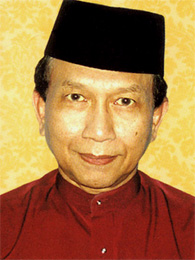Minister in the Prime Minister's Department, Datuk Seri Dr Rais Yatim, has called the United Nations' new Resolution on Sexual Orientation and Human Rights ill-advised when it threatened to punish nations which banned homosexual activities through a new resolution to be tabled in April.

Datuk Seri Dr Rais Yatim, Minister in the Prime Minister's Department
"The municipal or domestic laws of a nation should not be dictated by the UN's mechanism of laws, unless the former wants to comply," Dr Rais said in the New Straits Times on Sunday. He said that the resolution, if approved, could be interpreted as UN intervening in a nation's sovereignty.
"We will have to see first how the contents of the resolution are written."
"We will also have to see how many countries will subscribe to it. There are countries, including Malaysia, that do not recognise sexual relations between males and such a law is sovereign and basic to us." Homosexuality is outlawed in Malaysia as well as all Islamic fundamentalist states where gay men and lesbians are jailed, flogged and/or killed.
The UN Commission on Human Rights Resolution on Resolution on Sexual Orientation and Human Rights, was first introduced by Brazil in April 2003 but was postponed until the 2004 session under heavy pressure from the Vatican and the Organisation of Islamic States, which includes Egypt, Libya, Malaysia, Pakistan and Saudi Arabia.
The Vatican had also lobbied predominantly Latin American countries to vote against the resolution.
The resolution, which is co-sponsored by Canada and eighteen European countries, is the first in the history of the UN to specifically address the human rights of lesbians, gay men, bisexual and transgender people worldwide. It also encourages governments to take a more active role to prevent discrimination and violence based on sexual orientation such as murder, torture, and arbitrary arrest and detention.
The International Gay and Lesbian Human Rights Commission (IGLHRC) has called on GLBT organisations and allies around the world to call on their governments to support of the resolution that "specifically asserts that abuses on the basis of sexual orientation are human rights violations."

Datuk Seri Dr Rais Yatim, Minister in the Prime Minister's Department
The resolution is expected to be considered at the 60th session of the United Nations Commission on Human Rights which is scheduled to run from March 15 - April 23 in Geneva, Switzerland.
Last year, Pakistan issued a memorandum to commission members on behalf of the Organisation of the Islamic Conference which stated the "resolution directly contradicts the tenets of Islam and other religions," and its approval would be "a direct insult to the 1.2 billion Muslims around the world."
The Geneva-based UN Commission on Human Rights has 53 members. Currently, they are: Algeria, Argentina, Armenia, Australia, Austria, Bahrain, Belgium, Brazil, Burkina Faso, Cameroon, Canada, Chile, China, Congo, Costa Rica, Croatia, Cuba, France, Gabon, Germany, Guatemala, India, Ireland, Japan, Kenya, Libya, Malaysia, Mexico, Pakistan, Paraguay, Peru, Poland, Republic of Korea, Russian Federacion, Saudi Arabia, Senegal, Sierra Leone, South Africa, Sri Lanka, Sudan, Swaziland, Sweden, Syrian Arab Republic, Thailand, Togo, Uganda, Ukraine, United Kingdom, United States, Uruguay, Venezuela, Viet Nam, Zimbabwe.











 Printable Version
Printable Version










Reader's Comments
Be the first to leave a comment on this page!
Please log in to use this feature.